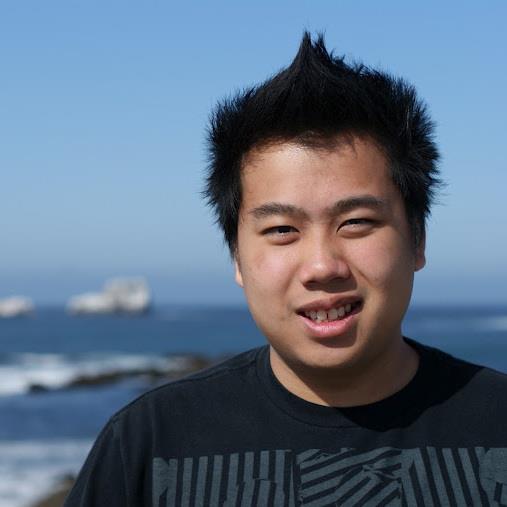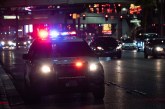 In the press conference at the Quad on Wednesday, Ian Lee spoke. He was a first-year student, two months into college, when he got involved in the protest that would ultimately alter his life.
In the press conference at the Quad on Wednesday, Ian Lee spoke. He was a first-year student, two months into college, when he got involved in the protest that would ultimately alter his life.
“By now, the pepper-spray incident is almost a bit cliché: students protested, the University sent in riot police, and then the police brutalized us with pepper spray,” he said in his speech Wednesday. “But I urge people interested in this case to think about the pepper-spray incident more complexly. The reason we were protesting was that the University had proposed unfair and unreasonable tuition hikes.”
He argued that the university was, in essence, enforcing its tuition hikes through the pepper spraying of students.
“The days that followed November 18th, I suffered major panic attacks. And so, to me, the pepper-spray incident told me that I had no right to speak out against the University’s unreasonable tuition hikes,” he said. “In fact, for weeks following the incident, I was afraid to protest at all. The University silenced me. The University squashed my First Amendment Rights, and hopefully this lawsuit tells them that students should not have to be afraid to speak out or to dissent.”
Nevertheless, speaking to the Vanguard later on Wednesday in a phone interview, he said that he was reasonably pleased with the settlement.
“But,” he said, “we still have to continue fighting privatization of the university, increasing tuition costs and, of course, make sure that events like November 18 never happen again.”
Mr. Lee told the Vanguard that he felt that the lawsuit could have gone on for years, with uncertainty of the outcome.
“I think that the settlement is a step in the right direction,” he said.
Ian Lee learned some cynical lessons from this episode.
“It seems to me that the university values its property more than the health and well-being of its own students,” Mr. Lee said. “I think through the Kroll and Reynoso reports we’ve really been shown that.”
He pointed out that in response to the student protests, the university sent in “riot cops.”
Through the Kroll and Reynoso reports, the university has been shown to be dysfunctional in terms of its operations, he added.
“I got a really interesting first year of college,” he said and noted that he hopes he can look back on this and see that through the protests that students were able to stop rising tuitions and privatization of the university.
The settlement, as we have discussed, has multiple parts to it. There is the million-dollar settlement, there is the letter of apology, and there is, as the ACLU attorney indicated in our previous article, the fact that they will be allowed to shape policy, which is a huge victory that they obtained.
The ACLU will get to review progress after two years.
The Vanguard asked Ian Lee his view of what the most important part of the settlement was for him.
“All parts of the settlement had significant weight,” he said. “I’m going to spend of all the money that I’m going to receive in this settlement on future tuition.”
“I know that even if it’s disingenuous, that a lot of people will enjoy and be satisfied with the apology from Katehi,” he said. “I know ACLU is working really hard with the university to try to change campus policies with regards to the police.”
Mr. Lee added, “I don’t think we as students should be satisfied until the police are entirely accountable to the students.”
As the Vanguard previously reported, the university and police are denying wrongdoing and claiming they acted in good faith.
“Defendants have denied and continue to deny each and all of the claims alleged by Plaintiffs in the Litigation. Defendants contend that they acted reasonably and in good faith to address legitimate health and safety risks associated with an unpermitted encampment on the Quad, and not out of any intent to suppress debate and protest, or to deprive Plaintiffs of their civil rights,” the settlement read.
But Ian Lee overall seemed satisfied with the findings that Kroll and Reynoso brought to light.
“It’s very clear, especially the Kroll and Reynoso reports, that the university is and was at fault – that they’re entirely at fault,” he said adding, “So I am a little bit disappointed about that.”
Ian Lee was one of those pepper sprayed by the university. He described in his speech that, in “the days that followed November 18th, I suffered major panic attacks.”
He told the Vanguard that since the incident, he is very anxious around police officers.
“Now I’ve learned that the police are not accountable to the students and students cannot trust police to solve any problems I might face,” he said.
As a freshman at the time of the incident, Mr. Lee still has several years left at the university, but he said he’s not sure that the university will ever be able to rebuild that trust.
“Practically, I’m not sure the university can ever rebuild that trust,” he said, though he suggested that giving the students some measure of control over the police and police policies, in addition to the university stopping its movement toward privatization and stopping attempts to supplement its shortfalls with tuition hikes, “then I suppose I can begin trusting the university.”
But he said it is hard for him to conceive of those things happening.
“I think that the current developments are steps in the right direction but I won’t be completely satisfied until police are entirely accountable to the students and I’m not satisfied until the message of our protests against the privatization of the university and the austerity measures that the university’s imposing – I won’t be satisfied until all of that gets addressed,” Ian Lee added.
As for the money, as he noted in his speech, “To the repeated question ‘what are you doing with the money?,’ the University of California is going to take it all back as tuition/fees. And then it’ll take some more.”
—David M. Greenwald reporting






Ian wrote:
> And so, to me, the pepper-spray incident told me
> that I had no right to speak out against the
> University’s unreasonable tuition hikes,”
You have always had the right to “speak out” against the University’s tuition hikes you just learned that there may be downsides of “speaking out” anywhere you want (try closing I80 this afternoon to “speak out”)…
You can also drive over to Governor Brown’s condo in Mid Town at about 2:00 am and start banging on the door “speaking out” about tuition hikes and you will probably get pepper sprayed again (or tazed like the guy below that picked a bad time to “speak out” to Senator Kerry):
http://www.youtube.com/watch?v=8XWijwmvGU4
P.S. Keeping all the money is a nice FU to your fellow UCD students who will be getting tuition hikes to cover the $2 million + cost of your (and others) “speaking out” against tuition hikes…
[quote]P.S. Keeping all the money is a nice FU to your fellow UCD students who will be getting tuition hikes to cover the $2 million + cost of your (and others) “speaking out” against tuition hikes… [/quote]
“Keeping all the money” would be the case if Mr. Lee were a senior and not planning on enrolling again at UCD.
This would not seem to the be the case. There is little difference in my mind in what I see as a very laudable use of the money as previously suggested in starting a fund for future students, and then applying to the fund for one years tuition, and Mr. Lee’s plan to directly use his money to pay for future education at UCD. In either case, UCD will be the recipient of this money.
Having said that, I am deeply disappointed in this settlement. I would have been much more in favor of a process such as that previously suggested by Robb Davis which would actually constructively address the concerns, responsibilities and errors of all of the involved parties and actually provide some benefit in terms of
future community collaborative efforts instead of our usual single minded focus on who gets control of how much money.
A caller into a radio show said this morning that one of the students receiving a settlement is on a full scholarship and will be buying a new car with the money. If true, how does everyone feel about that?
“
P.S. Keeping all the money is a nice FU to your fellow UCD students who will be getting tuition hikes to cover the $2 million + cost of your (and others) “speaking out” against tuition hikes…”
It’s highly unlikely there would be a tuition hike to cover a few million spent UC System-wide, especially when they have a risk fund for such purposes.
“It’s highly unlikely there would be a tuition hike to cover a few million spent UC System-wide, especially when they have a risk fund for such purposes.”
Ah, but now that self insured risk fund has taken a huge hit and will have to be replenished. Like I said, all this money is coming out of the same pot.
“A caller into a radio show said this morning that one of the students receiving a settlement is on a full scholarship and will be buying a new car with the money. If true, how does everyone feel about that?”
Why does it matter? They were not given the settlement under the condition that they use the money any particular way.
“Ah, but now that self insured risk fund has taken a huge hit and will have to be replenished. Like I said, all this money is coming out of the same pot.”
We don’t know how much is in the fund nor do we know the process by which that money is replenished, it may be a routine extraction over time.
“Why does it matter? They were not given the settlement under the condition that they use the money any particular way.”
You’re right, they can use the money any way they want. But you and others have been saying that the money will most likely be used to pay tuition and college costs and thereby go back to the college. If this caller was correct, we have an example where a student is already on a full scholarship and going to use the money to pay for a new car. I think a lot of people would find that very interesting. For instance, how many of the students who won settlement awards are on full scholarships (possibly state funded) and not the typical starving college student trying to just get by?
Mr. Lee certainly has a positive attitude and that will serve him well in the coming years as he continues to deal with PTSD.
Many thought that law enforcement would change after the Rodney King fiasco, but all these years later police are still doing the same dumb and dangerous things.
Rusty: and most of them will. They didn’t get awarded the settlement because they were starving students, they were awarded it because the police mishandled a protest and violated the rights of student protesters and used excessive force.
Geeeez David, tell me something I already don’t know. You talk about missing the point.
Re: “It seems to me that the university values its property more than the health and well-being of its own students,” Mr. Lee said.
Million$ and Million$ spent on a new football stadium that gets used a few days a year. On many other building projects obviously not essential to the University’s core mission, which is…EDUCATION.
Katehi had to do her Walk of Shame last November, because she and the administration are beholden to property interests and the University’s core mission is on the back burner.
Good on the protestors for keeping this perspective alive!
rusty 49 wrote:
“A caller into a radio show said this morning that one of the students receiving a settlement is on a full scholarship and will be buying a new car with the money. If true, how does everyone feel about that?”
About the same I’d feel if a caller into a talk radio show said the sky was falling.
[quote]Mr. Lee certainly has a positive attitude and that will serve him well in the coming years as he continues to deal with PTSD. [/quote]
I didn’t see where is said Mr Lee has PTSD from this incident. If someone did get PTSD from this incident they are weak and could have gotten PTSD from something as simple as McDonalds getting their order wrong. You can receive more trauma from a fender bender. Bring up PTSD in this case is an insult to those who do have PTSD.
Mr.Obvious
[quote]Bring up PTSD in this case is an insult to those who do have PTSD.[/quote]
I am sorry to be pedantic about this, but from a medical point of view this is simply not true. PTSD is a psychiatric condition triggered by trauma. People with different biochemical neurologic make ups may require very different amounts of “trauma” to trigger this syndrome. This is not a matter of being “weak” or “strong” in any kind of moral sense ( as I am taking to be your implication by saying it would be an insult to those who do have PTSD to classify this the same way). This would be analogous to telling someone with a major depression that they are not depressed because they are not suicidal.
Maybe he can spend some of his windfall on a haircut.
Maybe he can spend some of his windfall on a haircut.
Thanks for posting that Medwoman. I’m appalled at how judgmental people without any real expertise are on this issue. It’s good to have an actual medical opinion on here.
Also you’re dealing with an 18 year old here, two months into college. He started out thinking he was participating in a simple protest and suddenly you get cops with riot gear dumping pepper spray on you, it was shocking as a resident to watch the video, I can’t even imagine living through it.